Exam instructions MGT 1001: S 1 exam

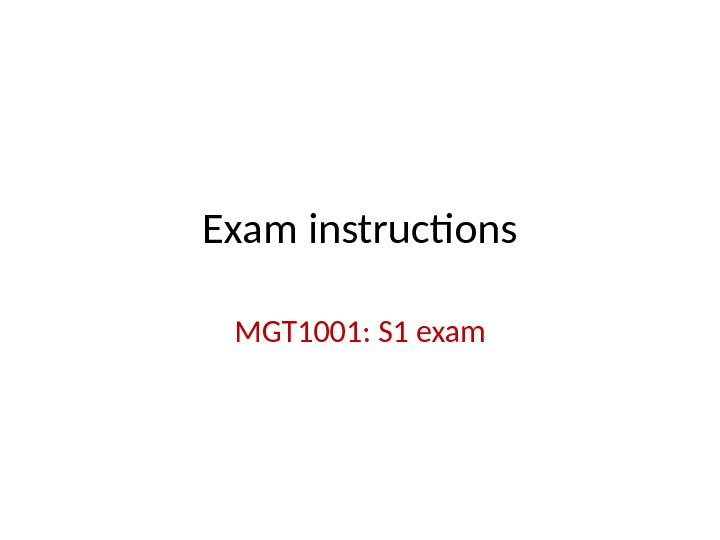
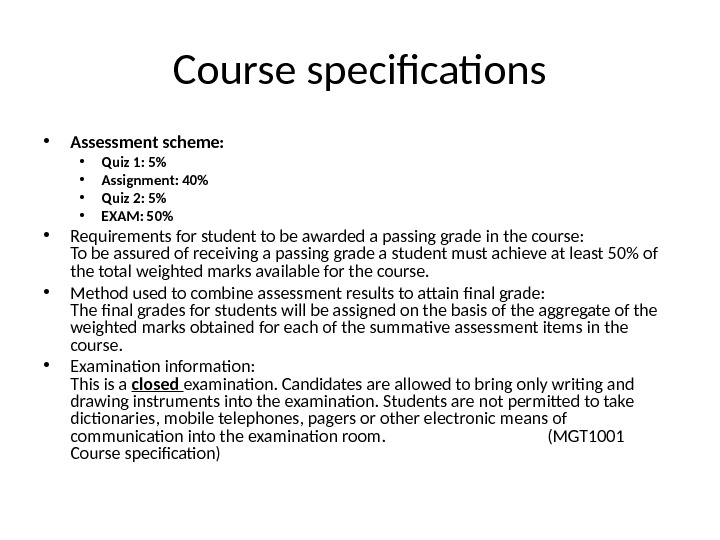
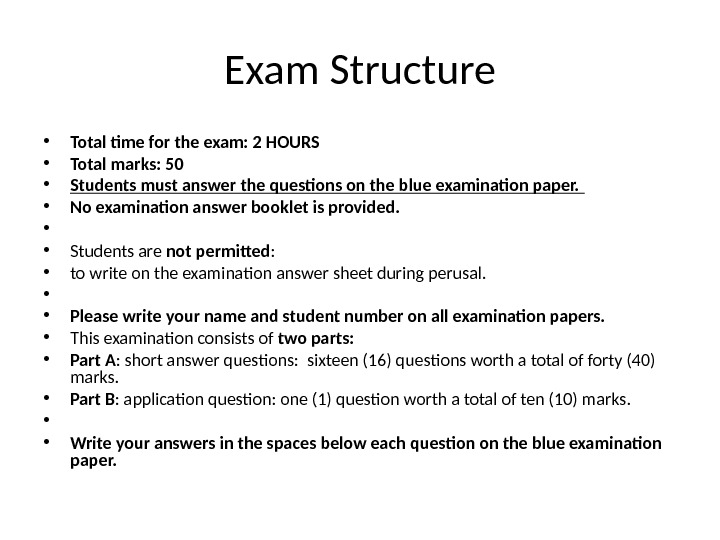
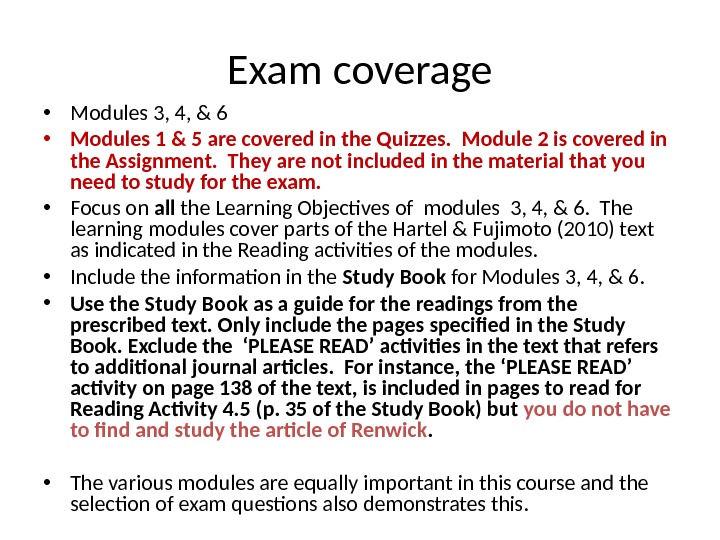

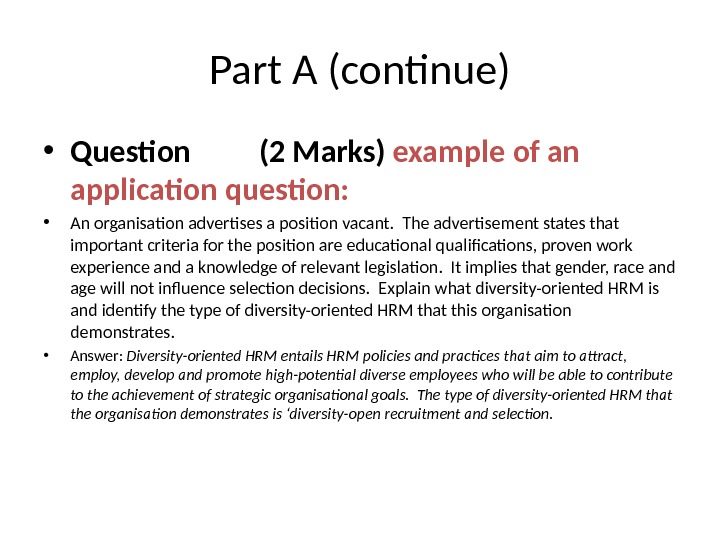
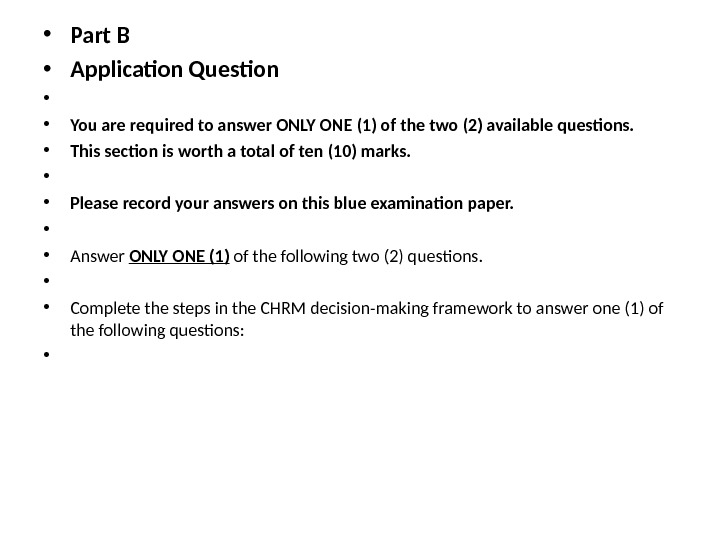
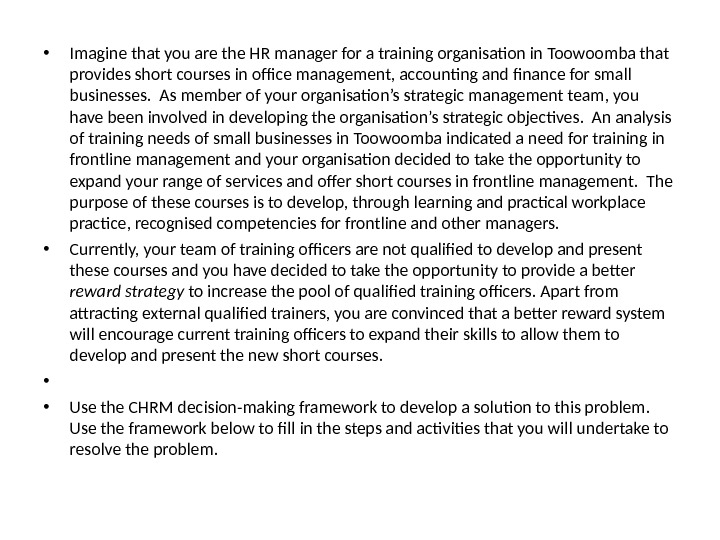
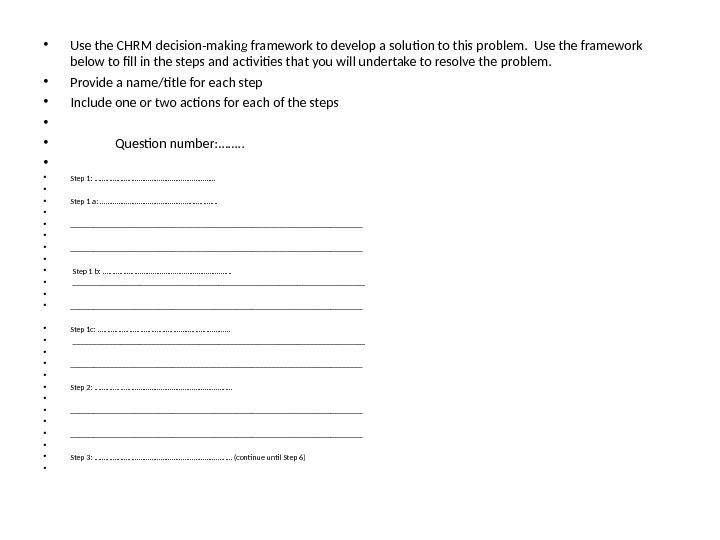
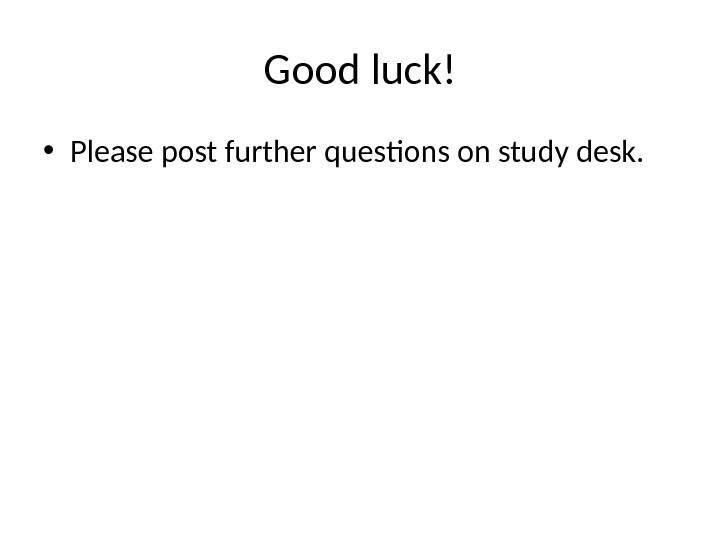
- Размер: 136.5 Кб
- Количество слайдов: 10
Описание презентации Exam instructions MGT 1001: S 1 exam по слайдам
 Exam instructions MGT 1001: S 1 exam
Exam instructions MGT 1001: S 1 exam
 Course specifications • Assessment scheme: • Quiz 1: 5% • Assignment: 40% • Quiz 2: 5% • EXAM: 50% • Requirements for student to be awarded a passing grade in the course: To be assured of receiving a passing grade a student must achieve at least 50% of the total weighted marks available for the course. • Method used to combine assessment results to attain final grade: The final grades for students will be assigned on the basis of the aggregate of the weighted marks obtained for each of the summative assessment items in the course. • Examination information: This is a closed examination. Candidates are allowed to bring only writing and drawing instruments into the examination. Students are not permitted to take dictionaries, mobile telephones, pagers or other electronic means of communication into the examination room. (MGT 1001 Course specification)
Course specifications • Assessment scheme: • Quiz 1: 5% • Assignment: 40% • Quiz 2: 5% • EXAM: 50% • Requirements for student to be awarded a passing grade in the course: To be assured of receiving a passing grade a student must achieve at least 50% of the total weighted marks available for the course. • Method used to combine assessment results to attain final grade: The final grades for students will be assigned on the basis of the aggregate of the weighted marks obtained for each of the summative assessment items in the course. • Examination information: This is a closed examination. Candidates are allowed to bring only writing and drawing instruments into the examination. Students are not permitted to take dictionaries, mobile telephones, pagers or other electronic means of communication into the examination room. (MGT 1001 Course specification)
 Exam Structure • Total time for the exam: 2 HOURS • Total marks: 50 • Students must answer the questions on the blue examination paper. • No examination answer booklet is provided. • • Students are not permitted : • to write on the examination answer sheet during perusal. • • Please write your name and student number on all examination papers. • This examination consists of two parts: • Part A : short answer questions: sixteen (16) questions worth a total of forty (40) marks. • Part B : application question: one (1) question worth a total of ten (10) marks. • • Write your answers in the spaces below each question on the blue examination paper.
Exam Structure • Total time for the exam: 2 HOURS • Total marks: 50 • Students must answer the questions on the blue examination paper. • No examination answer booklet is provided. • • Students are not permitted : • to write on the examination answer sheet during perusal. • • Please write your name and student number on all examination papers. • This examination consists of two parts: • Part A : short answer questions: sixteen (16) questions worth a total of forty (40) marks. • Part B : application question: one (1) question worth a total of ten (10) marks. • • Write your answers in the spaces below each question on the blue examination paper.
 Exam coverage • Modules 3, 4, & 6 • Modules 1 & 5 are covered in the Quizzes. Module 2 is covered in the Assignment. They are not included in the material that you need to study for the exam. • Focus on all the Learning Objectives of modules 3, 4, & 6. The learning modules cover parts of the Hartel & Fujimoto (2010) text as indicated in the Reading activities of the modules. • Include the information in the Study Book for Modules 3, 4, & 6. • Use the Study Book as a guide for the readings from the prescribed text. Only include the pages specified in the Study Book. Exclude the ‘PLEASE READ’ activities in the text that refers to additional journal articles. For instance, the ‘PLEASE READ’ activity on page 138 of the text, is included in pages to read for Reading Activity 4. 5 (p. 35 of the Study Book) but you do not have to find and study the article of Renwick. • The various modules are equally important in this course and the selection of exam questions also demonstrates this.
Exam coverage • Modules 3, 4, & 6 • Modules 1 & 5 are covered in the Quizzes. Module 2 is covered in the Assignment. They are not included in the material that you need to study for the exam. • Focus on all the Learning Objectives of modules 3, 4, & 6. The learning modules cover parts of the Hartel & Fujimoto (2010) text as indicated in the Reading activities of the modules. • Include the information in the Study Book for Modules 3, 4, & 6. • Use the Study Book as a guide for the readings from the prescribed text. Only include the pages specified in the Study Book. Exclude the ‘PLEASE READ’ activities in the text that refers to additional journal articles. For instance, the ‘PLEASE READ’ activity on page 138 of the text, is included in pages to read for Reading Activity 4. 5 (p. 35 of the Study Book) but you do not have to find and study the article of Renwick. • The various modules are equally important in this course and the selection of exam questions also demonstrates this.
 Part A • Short answer questions • • You are required to answer all sixteen (16) questions. • This section is worth a total of forty (40) marks. • • Please record your answers on this blue examination paper. • Question 1 (2 Marks) example of a simple, theory question: • Use the ‘social identity theory’ to explain how people respond to diversity in an organisation. • Answer: group members attempt to enhance their self-image and self-esteem by showing favouritism to other people who are in their own social group at the expense of those in another relevant group to which they do not belong. The majority group members will enjoy the positive spin offs with regard to rewards and support but the minority group members will not enjoy the advantages of the majority group members and this can lead to job dissatisfaction, job insecurity and poor performance.
Part A • Short answer questions • • You are required to answer all sixteen (16) questions. • This section is worth a total of forty (40) marks. • • Please record your answers on this blue examination paper. • Question 1 (2 Marks) example of a simple, theory question: • Use the ‘social identity theory’ to explain how people respond to diversity in an organisation. • Answer: group members attempt to enhance their self-image and self-esteem by showing favouritism to other people who are in their own social group at the expense of those in another relevant group to which they do not belong. The majority group members will enjoy the positive spin offs with regard to rewards and support but the minority group members will not enjoy the advantages of the majority group members and this can lead to job dissatisfaction, job insecurity and poor performance.
 Part A (continue) • Question (2 Marks) example of an application question: • An organisation advertises a position vacant. The advertisement states that important criteria for the position are educational qualifications, proven work experience and a knowledge of relevant legislation. It implies that gender, race and age will not influence selection decisions. Explain what diversity-oriented HRM is and identify the type of diversity-oriented HRM that this organisation demonstrates. • Answer: Diversity-oriented HRM entails HRM policies and practices that aim to attract, employ, develop and promote high-potential diverse employees who will be able to contribute to the achievement of strategic organisational goals. The type of diversity-oriented HRM that the organisation demonstrates is ‘diversity-open recruitment and selection.
Part A (continue) • Question (2 Marks) example of an application question: • An organisation advertises a position vacant. The advertisement states that important criteria for the position are educational qualifications, proven work experience and a knowledge of relevant legislation. It implies that gender, race and age will not influence selection decisions. Explain what diversity-oriented HRM is and identify the type of diversity-oriented HRM that this organisation demonstrates. • Answer: Diversity-oriented HRM entails HRM policies and practices that aim to attract, employ, develop and promote high-potential diverse employees who will be able to contribute to the achievement of strategic organisational goals. The type of diversity-oriented HRM that the organisation demonstrates is ‘diversity-open recruitment and selection.
 • Part B • Application Question • • You are required to answer ONLY ONE (1) of the two (2) available questions. • This section is worth a total of ten (10) marks. • • Please record your answers on this blue examination paper. • • Answer ONLY ONE (1) of the following two (2) questions. • • Complete the steps in the CHRM decision-making framework to answer one (1) of the following questions: •
• Part B • Application Question • • You are required to answer ONLY ONE (1) of the two (2) available questions. • This section is worth a total of ten (10) marks. • • Please record your answers on this blue examination paper. • • Answer ONLY ONE (1) of the following two (2) questions. • • Complete the steps in the CHRM decision-making framework to answer one (1) of the following questions: •
 • Imagine that you are the HR manager for a training organisation in Toowoomba that provides short courses in office management, accounting and finance for small businesses. As member of your organisation’s strategic management team, you have been involved in developing the organisation’s strategic objectives. An analysis of training needs of small businesses in Toowoomba indicated a need for training in frontline management and your organisation decided to take the opportunity to expand your range of services and offer short courses in frontline management. The purpose of these courses is to develop, through learning and practical workplace practice, recognised competencies for frontline and other managers. • Currently, your team of training officers are not qualified to develop and present these courses and you have decided to take the opportunity to provide a better reward strategy to increase the pool of qualified training officers. Apart from attracting external qualified trainers, you are convinced that a better reward system will encourage current training officers to expand their skills to allow them to develop and present the new short courses. • • Use the CHRM decision-making framework to develop a solution to this problem. Use the framework below to fill in the steps and activities that you will undertake to resolve the problem.
• Imagine that you are the HR manager for a training organisation in Toowoomba that provides short courses in office management, accounting and finance for small businesses. As member of your organisation’s strategic management team, you have been involved in developing the organisation’s strategic objectives. An analysis of training needs of small businesses in Toowoomba indicated a need for training in frontline management and your organisation decided to take the opportunity to expand your range of services and offer short courses in frontline management. The purpose of these courses is to develop, through learning and practical workplace practice, recognised competencies for frontline and other managers. • Currently, your team of training officers are not qualified to develop and present these courses and you have decided to take the opportunity to provide a better reward strategy to increase the pool of qualified training officers. Apart from attracting external qualified trainers, you are convinced that a better reward system will encourage current training officers to expand their skills to allow them to develop and present the new short courses. • • Use the CHRM decision-making framework to develop a solution to this problem. Use the framework below to fill in the steps and activities that you will undertake to resolve the problem.
 • Use the CHRM decision-making framework to develop a solution to this problem. Use the framework below to fill in the steps and activities that you will undertake to resolve the problem. • Provide a name/title for each step • Include one or two actions for each of the steps • • Question number: ……. . • • Step 1: …………………………… • • Step 1 a: ……………………………. • • __________________________________________________________________________ • • Step 1 b: ………………………………. • _____________________________________ • • _____________________________________ • Step 1 c: ……………………………… • __________________________________________________________________________ • • Step 2: ………………………………… • • __________________________________________________________________________ • • Step 3: ………………………………… (continue until Step 6) •
• Use the CHRM decision-making framework to develop a solution to this problem. Use the framework below to fill in the steps and activities that you will undertake to resolve the problem. • Provide a name/title for each step • Include one or two actions for each of the steps • • Question number: ……. . • • Step 1: …………………………… • • Step 1 a: ……………………………. • • __________________________________________________________________________ • • Step 1 b: ………………………………. • _____________________________________ • • _____________________________________ • Step 1 c: ……………………………… • __________________________________________________________________________ • • Step 2: ………………………………… • • __________________________________________________________________________ • • Step 3: ………………………………… (continue until Step 6) •
 Good luck! • Please post further questions on study desk.
Good luck! • Please post further questions on study desk.

